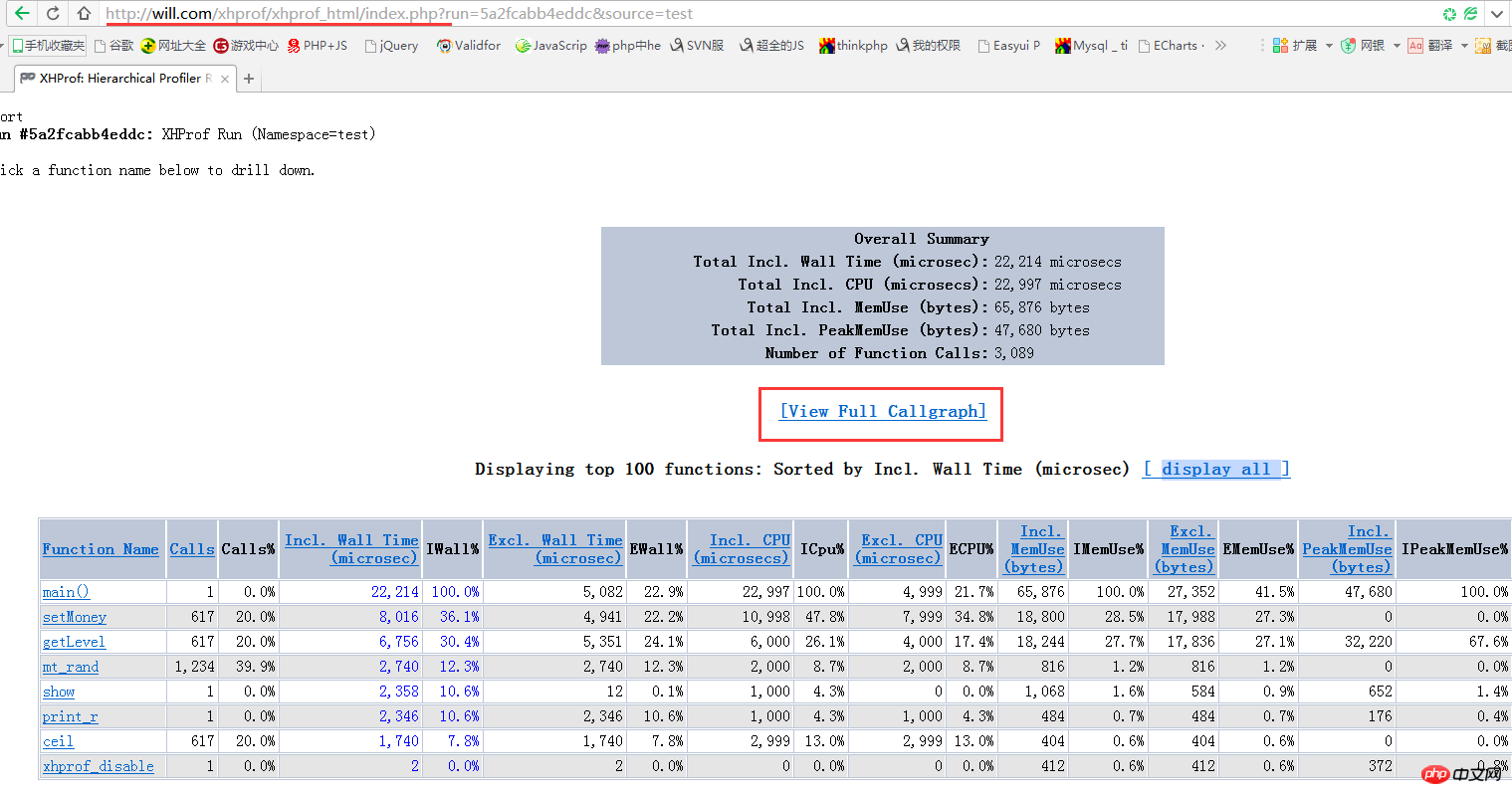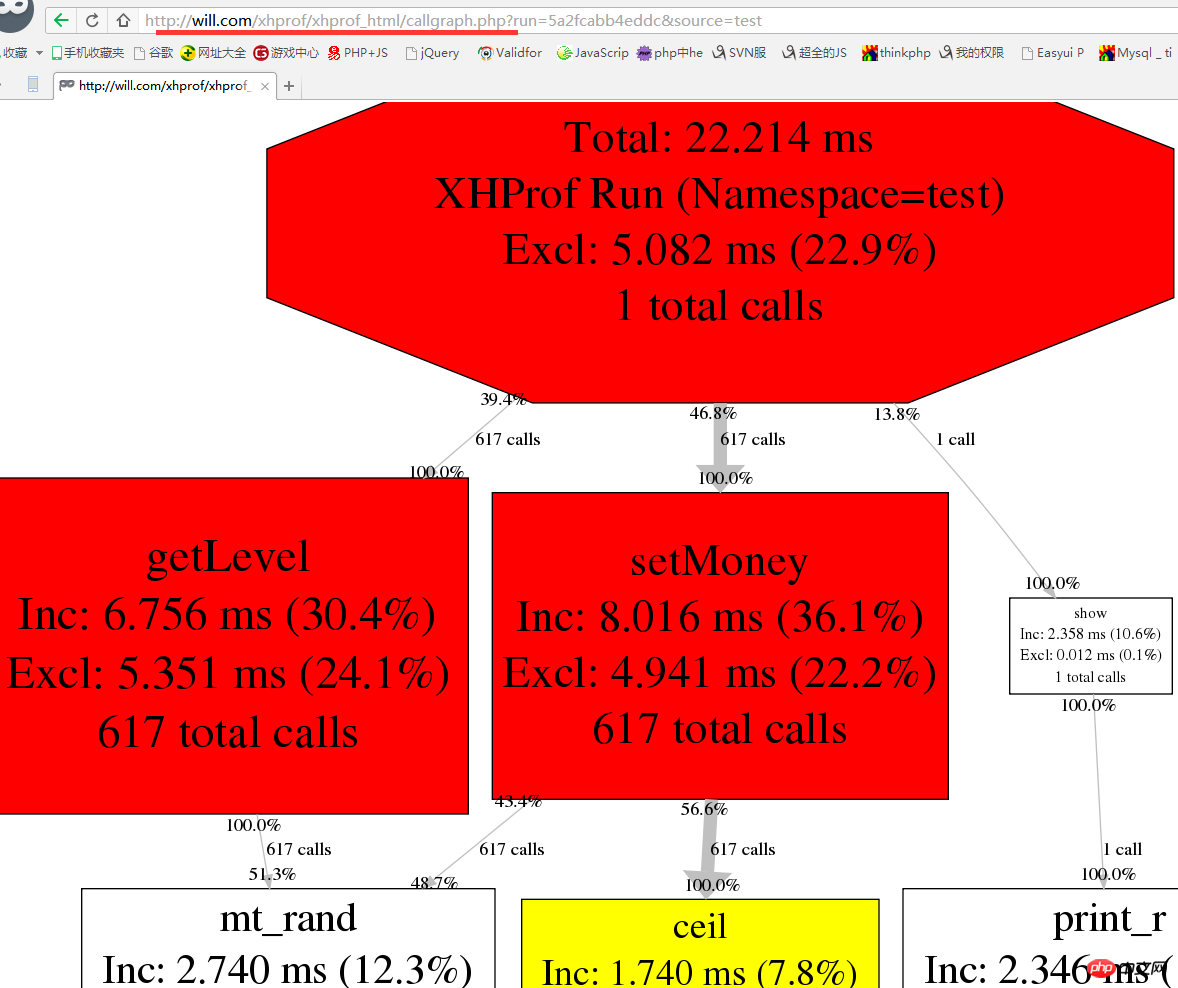
The editor below will share with you an example of using XHProf to find PHP performance bottlenecks. It has a good reference value and I hope it will be helpful to everyone. Let’s follow the editor to take a look.
XHProf is an extension developed by Facebook to test PHP performance. This article records the method of using XHProf to optimize PHP performance and find performance bottlenecks in PHP applications.
1. Install Xhprof extension
//github上下载https://github.com/facebook/xhprof unzip xhprof-master.zip cd xhprof-master/extension/ /usr/local/php/bin/phpize ./configure --with-php-config=/usr/local/php/bin/php-config --enable-xhprof make && make install
2. Modify the xhprof.output_dir in the php.ini
[xhprof] extension=xhprof.so xhprof.output_dir=/tmp
configuration to specify the location where the generated profile file is stored. We specify it as / tmp.
3. Move the relevant files into the project
//xhprof下载压缩包中的xhprof_html和xhprof_lib cp -r xhprof-master/xhprof_html /usr/local/nginx/html/xhprof/ cp -r xhprof-master/xhprof_lib /usr/local/nginx/html/xhprof/
Configure a domain name and browse The server can access http://will.com/xhprof/xhprof_html/index.php
server{ listen 80; server_name will.com; location / { root /usr/local/nginx/html; index index.html; } location ~ \.php$ { root html; fastcgi_pass 127.0.0.1:9000; fastcgi_index index.php; fastcgi_param SCRIPT_FILENAME $document_root$fastcgi_script_name; include fastcgi_params; } }
## 4. Install graphivz
//需要安装graphviz否则查看性能图片时候会报failed to execute cmd: " dot -Tpng". stderr: `sh: dot: command not found ' yum -y install graphviz
5. Write test files
//入口文件的开始位置 xhprof_enable(XHPROF_FLAGS_MEMORY | XHPROF_FLAGS_CPU); 业务逻辑... //业务逻辑结束后 $xhprof_data = xhprof_disable(); include_once "/usr/local/nginx/html/xhprof/xhprof_lib/utils/xhprof_lib.php"; include_once "/usr/local/nginx/html/xhprof/xhprof_lib/utils/xhprof_runs.php"; $objXhprofRun = new XHProfRuns_Default();//数据会保存在php.ini中xhprof.output_dir设置的目录去中 $run_id = $objXhprofRun->save_run($xhprof_data, "test");
"; print_r($info); } //不作数据校验 $rules = array( 2=>array('min'=>1, 'max'=>10, 'chance'=>30),//金额:分 概率:百分之(默认为100%,不足100%按第一档计算) array('min'=>11, 'max'=>25, 'chance'=>60), array('min'=>26, 'max'=>50, 'chance'=>10), array('min'=>50, 'max'=>80, 'chance'=>0), array('min'=>80, 'max'=>100, 'chance'=>0), ); $total_money = 10000;//红包总金额 $res = array(); while($total_money>0) { $index = getLevel($rules); $money = setMoney($rules, $index); if ($money > $total_money)//金额不足 { $money = $total_money; $total_money = 0; } else { $total_money -= $money; } $res[] = ($index+1)."---".$money; } echo show($res); echo $total_money . "
"; //1.先确定档次 function getLevel($rules) { $level = array(); $chance = 0; foreach($rules as $k=>$v) { if ($v['chance']>0) { $chance += $v['chance']*100;//扩大100倍 $level[$k] = $chance; } } $index = 0; $rand_num = mt_rand(1, 10000); foreach($level as $k=>$v) { if ($rand_num <= $v) { $index = $k; break; } } return $index; } //2.确定档次之后,再确定金额 function setMoney($rules, $index) { $money = mt_rand($rules[$index]['min']*10000, $rules[$index]['max']*10000)/10000; $money = ceil($money); $money > 1 && $money = $money -1;//防止出现免单情况 return $money; } $xhprof_data = xhprof_disable(); include_once "/usr/local/nginx/html/xhprof/xhprof_lib/utils/xhprof_lib.php"; include_once "/usr/local/nginx/html/xhprof/xhprof_lib/utils/xhprof_runs.php"; $objXhprofRun = new XHProfRuns_Default();//数据会保存在php.ini中xhprof.output_dir设置的目录去中 $run_id = $objXhprofRun->save_run($xhprof_data, "test"); echo "http://will.com/xhprof/xhprof_html/index.php?run=$run_id&source=test";//变量$runId是本次请求生成分析结果的id,最后我们输出了一个链接地址,使用改地址就可以看到本次请求的分析结果。
6. View analysis results
Run the business code first; Then the browser opens http://will.com/xhprof/xhprof_html/index.php, click the last time to generate the xhprof file
View Full Callgraph link in the middle, through which we can see the graphical analysis results

In addition, xhprof report field meaning:
Function Name: method name. Calls: The number of times the method has been called. Calls%: The number of method calls as a percentage of the total number of method calls at the same level. Incl.Wall Time(microsec): The time it takes for method execution, including the execution time of sub-methods. (Unit: microseconds) IWall%: The percentage of time spent in method execution. Excl. Wall Time (microsec): The time it takes to execute the method itself, excluding the execution time of sub-methods. (Unit: microseconds) EWall%: The percentage of time spent executing the method itself. Incl. CPU(microsecs): The CPU time spent on method execution, including the execution time of sub-methods. (Unit: microseconds) ICpu%: The percentage of CPU time spent in method execution. Excl. CPU (microsec): The CPU time spent executing the method itself, excluding the execution time of sub-methods. (Unit: microseconds) ECPU%: The percentage of CPU time spent executing the method itself. Incl.MemUse(bytes): The memory occupied by method execution, including the memory occupied by sub-method execution. (Unit: bytes) IMemUse%: The percentage of memory occupied by method execution. Excl.MemUse(bytes): The memory occupied by the execution of the method itself, excluding the memory occupied by the execution of sub-methods. (Unit: bytes) EMemUse%: The percentage of memory occupied by the method itself. Incl.PeakMemUse(bytes): Incl.MemUse peak value. (Unit: Bytes) IPeakMemUse%: Incl.MemUse peak percentage. Excl.PeakMemUse(bytes): Excl.MemUse peak value. Unit: (byte) EPeakMemUse%: Excl.MemUse peak percentage. The above example of using XHProf to find PHP performance bottlenecks is all the content shared by the editor. I hope it can give you a reference, and I hope you will support the PHP Chinese website. Articles you may be interested in:Related summary of custom template directives in the Laravel framework
Example explanation of PHP recursive implementation of quick sorting method
Detailed explanation of PHP implementation of git deployment method tutorial
The above is the detailed content of Example explanation of using XHProf to find PHP performance bottlenecks. For more information, please follow other related articles on the PHP Chinese website!




